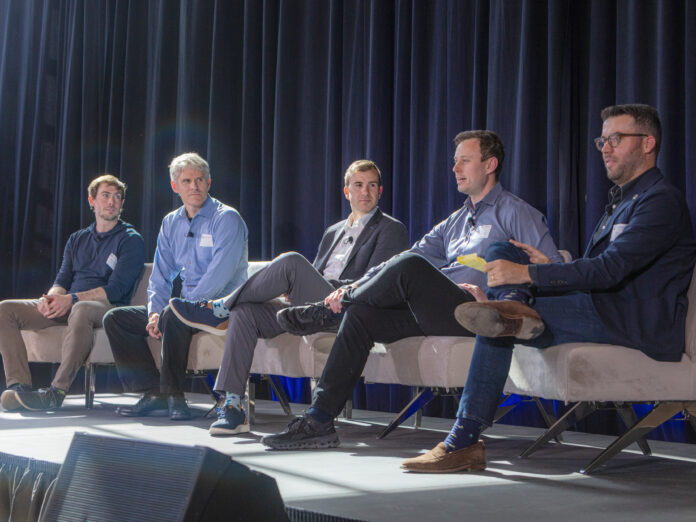
Dozens of Seattle biotech companies are using artificial intelligence to design new medical treatments. But at a conference of industry leaders and investors this week, scientists delivered a nuanced message: AI holds enormous promise, but expectations need to stay grounded in reality.
The trade association Life Science Washington and investment firm Madrona hosted the one-day forum in downtown Seattle delving into biotech, pharma and AI.
“There is some over hype on the breadth and the depth of the capabilities of some of these AI models,” said Jamie Lazarovits, CEO and co-founder of Archon Biosciences. Researchers need “to be really cautious” when drawing conclusions from the data generated by the models, he said.
And yet there’s a lot to be excited about.
“What was science fiction 15 years ago is now reality,” said Erik Procko, chief scientist for Cyrus Biotechnology. “So yes, there’s been hype. But there’s still enormous potential, and sometimes the progress that is being made is just dizzying.”
Lazarovits and Procko were part of a panel including four Seattle startups harnessing AI. Each company is tackling different challenges in drug development:
- Archon, a company that emerged from stealth more one year ago with $20 million in financing, is using AI to design proprietary protein structures, known as Antibody Cages or AbCs, that are intended to help antibodies bind to target cells and avoid other cells.
- Cyrus is designing drugs with a focus on identifying and removing areas that will trigger an immune-system response — a challenge called immunogenicity. The 10-year-old company has raised $36.6 million according to PitchBook.
- Outpace Bio, a startup founded in 2021 that has raised $200 million, is engineering proteins that aim to bolster T-cell therapies for solid tumors, which constitute 90% of cancers. Tumors are discouragingly good at deflecting current T-cell treatments, which often stop working within a month.
- Talus Bioscience, which launched in 2020 and has nearly $20 million, is targeting transcription factors — proteins that are part of the “regulome” that turns genes off and on. The company is targeting transcription factors that activate genes that drive specific cancers.
Beyond discussing their own work, the panelists identified key principles for how AI should — and shouldn’t — be used in biotech research:
Augmenting researchers, not replacing them
Marc Lajoie, co-founder and CEO of Outpace, compared AI tools to the robotic exoskeleton donned by Ripley and others in the sci-fi film Aliens to move heavy cargo — and battle the ET Xenomorph Queen.
“It makes the researcher better,” he said. “We’re not trying to replace the researcher.”
Models must meet reality
Lazarovits noted that while AI can generate exciting leads and information, it doesn’t mean much until it has been tested in actual experiments with cells and organisms.
“Whenever we try to adopt new models, new AI methods, you can become incredibly excited by having this silicon validation,” he said. “But the reality is, is what do you actually validate in the wet lab?”
The real bottleneck: clinical trials
AI is great for engineering new therapies, but the most costly, laborious part of the drug development process is seeing how they work in patients.
“The most impactful place for AI to really change the game for drug development would be to make smaller, better powered clinical studies,” said Lajoie. The way to do that, he added, was coming up with better drug candidates that perform multiple functions.
Still searching for AI’s breakthrough moment
Procko is still waiting for AI to go further in spurring advancements in biotech and pharmacology.
“AI is fantastic these days for predicting, say, a protein structure, but for creating new drugs it hasn’t yet found its killer app,” said Procko. “What is it that AI is letting us do now to make new drugs that was simply impossible to make before? How is it being a game changer?”
The question captures a central tension discussed at the panel and conference: while AI has transformed how Seattle’s biotech companies approach drug design, the industry is still navigating the gap between computational promise and clinical proof.
Source link






